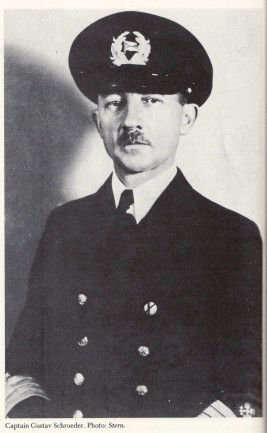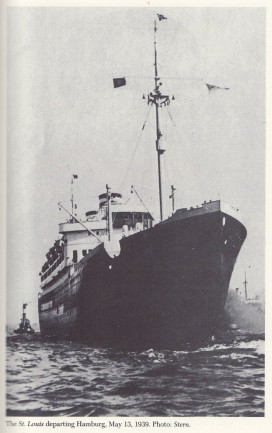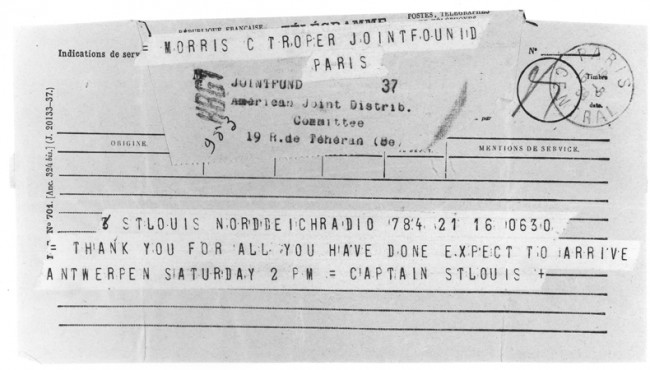Gustav Schröder was the German captain of the MS St Louis, which on 13 May 1939 set sail from Hamburg carrying 937 Jews to Cuba. At least that was the initial plan of the captain who will be made famous by this voyage. Embarking was no small feat, there are separate testimonies about this, but I will simply say that the tickets were prohibitively expensive, and under constant threat of arrest and deportation to the camps, reaching the harbour, even if you had the money, required a whole network of assistance and organisation. One of the people that lent a hand was Max Schmeling, a famous German boxer who concealed brothers Henri and Werner Lewin in his hotel room until they could embark in the hope of reaching New York, escaping Hitler’s regime, concentration camps, and almost certain death.

“Saturday, 13 May, Hamburg. Captain Gustav Schröder stands on the bridge watching his passengers on pier seventy-six in the Hamburg harbour. Full of hope, they have come to embark the ship that is to take them to freedom. Schröder is familiar with the usual chaos that ensues. Music from the ship’s chapel, heaps of piled up baggage, people with passports and embarkation papers in their hands, excited children, sirens, embraces, kisses, tears – it is all as usual when a luxury steamer such as the St Louis is setting sail. The only thing is that for the passengers of this “pleasure journey for nine hundred tourists”, as it is entered in the ship’s log, a return voyage has not been planned. Nine hundred German men, women and children are leaving Germany forever because they are Jews and are being systematically persecuted for it by their homeland.”
(from the book Summer of ‘39 by Werner Biermann)

On Saturday, 27 May, the ship reached Cuba, but the Jewish refugees from Germany were barred from disembarking. Despite the pressure of both the public and the press on President Brú, he refused to provide shelter to the ship’s passengers with “illegal documents obtained through bribery”. One man cut his wrists in desperation, but 28 passengers did possess “legal” documents. The remaining passengers that the Captain refused to return to Germany expected to find shelter in America, which they perceived as the “land of freedom”.
On 4 June, the MS St Louis is in the Caribbean, off the shore of Florida. The coastguard refuses access to the shore. Roosevelt is on the campaign trail, the US is fraught with unemployment, no one wants immigrants coming in “taking our jobs”. Canada also refuses them. And so does the Dominican Republic. Captain Schröder sends telegrams to governments throughout the world, but his appeals for help fall on deaf ears. No one wants the already desperate passengers, and Goebbels is jubilant over their misfortune, because he wants to whole world to see how no one wants the Jews. The press refer to this as the “voyage of the damned” and Captian Schröder is ordered to return the ship to Germany, which he resolutely refuses, and in a telegram says he will “leave the ship ablaze on the British shore”. After a protracted agony, several governments send word that they will accept the passengers: the Netherlands (181), Belgium (214), France (224), and Great Britain (287). The passengers celebrate their saviour, Captain Gustav Schröder. (For the passengers that disembark on mainland Europe, this will not be the last time they are forced to flee. Almost all of them were later taken to the camps and over 300 died there. Only those accepted by Great Britain fared better, but some of them also died in the bombings.)

The start of World War 2 found Captain Schröder returning to Germany where he was promptly sent into retirement. It was to be his final voyage, but until the end of his life (in 1959), the grateful passengers from the MS St Louis sent him packages of food and donations for sustenance.
—————————————————————————————————–
Today’s passengers on the St Louis, these unwanted people running for their lives, fleeing war and persecution in the hopes of finding a better life in peace, are all around us. Under cover of night, they travel in boats that take on passengers five times above their capacity, they cross national borders in secret, walking for months in already tattered shoes, women and children wait for days without food or water for the next smuggler who will take them somewhere safer. They call them asylum seekers and nobody wants them. In the countries through which they pass, people turn their heads away. And they themselves endeavour to be invisible. In the countries they want to reach, they are unwanted, unemployment is high everywhere, no one wants to share their hard-earned bread with some refugee from halfway across the globe. There are no more Captain Schröders in Europe to resist the powers that be and appeal to those that can help.
No one opens the door to people fleeing war.
Europe admires itself for having defeated fascism 70 years ago.
Europe is silent while in some corner of the world war still rages, just as in 1939, people fleeing war were universally unwanted.
Hungary is building a wall on its border with Serbia to stop the influx of refugees.
26 years after the fall of one wall, Europe is building another. The responsibility will be shouldered by Hungary, but to be fair – no one has spoken up against that wall.
There is no better way for a world calling itself civilised and humane to prove it than by saving people fleeing war.
Today, just like in 1939, whole ships can be saved only by a mensch.
Is there one such among us in Europe in 2015?
In 1939, among the refugees were Thomas Mann, Albert Einstein, Bertolt Brecht and many others who stood up to Hitler’s regime in various ways. Look around you – perhaps among the people against whom walls are being raised is a future Nobel Laureate, an author, a scientist… And perhaps just a labourer looking to save his life, not caring about what job he ends up doing in that better world.
Fascism is every ideology that does not view people as individuals but as a group to be guarded against or to be defeated.
What were you celebrating in May, Europe? Who did you defeat only to build walls again? Did you truly defeat fascism as in your hubris you claim?
We turn our heads from the suffering of others, as almost all governments in the world in 1939 turned their heads so as not to see the fates of the passengers on the St Louis.
Voyages of the damned span the seas again, but the shores grow increasingly distant.
“Anxious we sit close to the borders
Waiting for the day of return, and watch each slight change
Across the border, Rush to question
Every refugee, forgetting nothing and
Omitting nothing,
And forgiving nothing, we forgive nothing.
Oh… the cries from their camps are heard even here…”
Bertolt Brecht